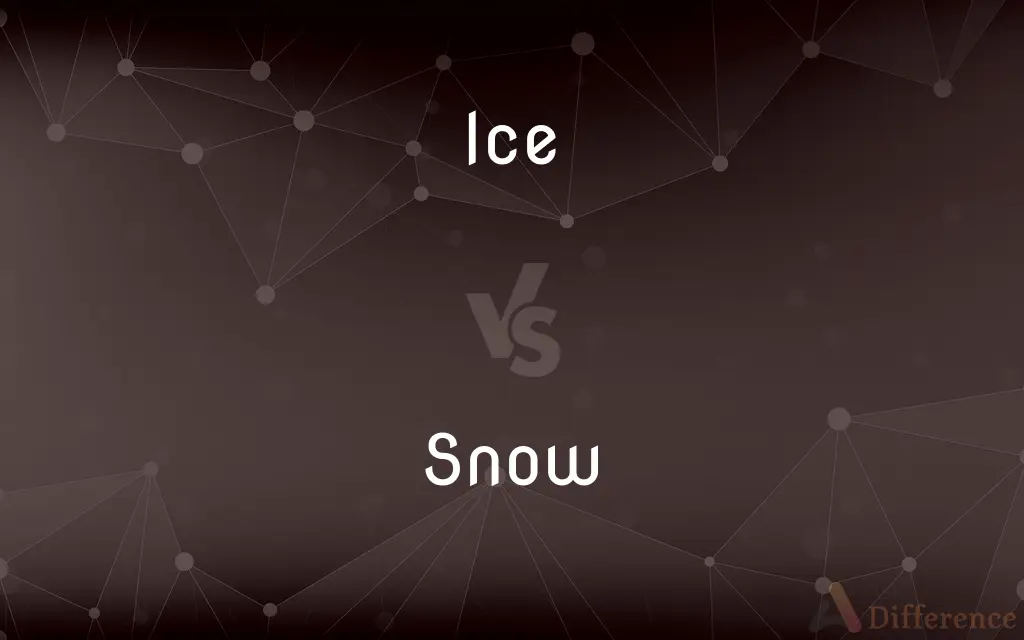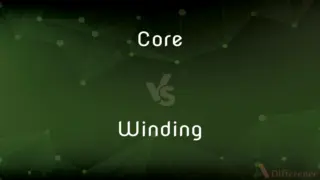Ice vs. Snow — What's the Difference?
By Tayyaba Rehman — Updated on October 3, 2023
"Ice" is frozen water forming a solid, while "snow" consists of soft, white crystals formed when water vapor in the atmosphere freezes.

Difference Between Ice and Snow
Table of Contents
ADVERTISEMENT
Key Differences
Ice and snow, while both forms of solid water, differ greatly in their formation, texture, and appearance. Ice is typically a clear, hard solid formed when liquid water freezes. It can form on a pond, in a freezer, or even on a cold windowpane. Snow, on the other hand, is a multitude of tiny ice crystals that come together when atmospheric water vapor freezes, usually in clouds, and then descends to the ground.
It's interesting to note that while both ice and snow are cold and solid, their physical properties can be quite different. A frozen lake is solid ice and can often support the weight of a person or even a vehicle. In contrast, snow, being a collection of ice crystals, is fluffy and compressible. Stepping on a snow-covered ground gives a very different sensation than stepping on a sheet of ice.
From an aesthetic point of view, ice and snow also differ greatly. Ice tends to be clear to cloudy in appearance and can form large sheets or icicles. Snow, on the other hand, falls as small, individual flakes, each with its own unique structure, and accumulates in soft blankets covering landscapes. Moreover, ice can have a slippery surface, posing challenges in walking or driving. Snow can also be slippery, especially when packed or melted and refrozen, but fresh snow often offers more traction.
While both ice and snow are closely associated with winter and cold temperatures, the conditions that lead to their formation differ. For ice to form, you simply need water and temperatures below freezing. Snow, however, requires a specific atmospheric process with moisture and freezing conditions in the atmosphere, leading to the development of snowflakes that eventually fall to the ground.
Comparison Chart
Nature
Solid frozen water
Soft, white ice crystals
ADVERTISEMENT
Formation
Formed by freezing liquid water
Formed from atmospheric water vapor
Texture
Hard and often clear
Fluffy, soft, and crystalline
Occurrence
Can form on any water source or moist surface
Falls from the sky during specific atmospheric conditions
Physical Interaction
Slippery, can be walked or skated on when thick
Compressible, can be walked on, piled, or molded
Compare with Definitions
Ice
Solid form of water.
The pond was covered in a thick layer of ice.
Snow
Frozen atmospheric vapor in crystalline form.
The children eagerly awaited the first snow of winter.
Ice
Glacial frozen water.
The explorers trekked across the vast ice sheet.
Snow
Soft, cold weather phenomenon.
The snow crunched under her boots as she walked.
Ice
Clear, crystalline substance.
The icicles hung like shimmering pieces of ice from the roof.
Snow
Snow comprises individual ice crystals that grow while suspended in the atmosphere—usually within clouds—and then fall, accumulating on the ground where they undergo further changes. It consists of frozen crystalline water throughout its life cycle, starting when, under suitable conditions, the ice crystals form in the atmosphere, increase to millimeter size, precipitate and accumulate on surfaces, then metamorphose in place, and ultimately melt, slide or sublimate away.
Ice
Ice is water frozen into a solid state. Depending on the presence of impurities such as particles of soil or bubbles of air, it can appear transparent or a more or less opaque bluish-white color.
Snow
Atmospheric water vapour frozen into ice crystals and falling in light white flakes or lying on the ground as a white layer
We were trudging through deep snow
Ice
An entry stored in a person's mobile phone that provides emergency contact information
All mobile phone users should have an ICE contact in their phones
Snow
A mass of flickering white spots on a television or radar screen, caused by interference or a poor signal
All that they could pick up on their screens was snow
Ice
Decorate (a cake or biscuit) with icing.
Snow
A dessert or other dish resembling snow
Vanilla snow
Ice
Clinch (something such as a victory or deal).
Snow
Cocaine.
Ice
Kill
She was saved from being iced by the mafia
Snow
Snow falls
It's not snowing so heavily now
Ice
Water frozen solid.
Snow
Mislead or charm (someone) with elaborate and insincere words
They would snow the public into believing that all was well
Ice
A surface, layer, or mass of frozen water.
Snow
Frozen precipitation consisting of hexagonally symmetrical ice crystals that form soft, white flakes.
Ice
Something resembling frozen water
Ammonia ice.
Snow
A falling of snow; a snowstorm.
Ice
A frozen dessert consisting of water, sugar, and a liquid flavoring, often fruit juice.
Snow
The white specks on a television screen resulting from weak reception.
Ice
Cake frosting; icing.
Snow
(Slang) Cocaine.
Ice
(Slang) Diamonds.
Snow
(Slang) Heroin.
Ice
(Sports) The playing field in ice hockey; the rink.
Snow
To fall as or in snow.
Ice
Extreme unfriendliness or reserve.
Snow
To cover, shut off, or close off with snow
We were snowed in.
Ice
(Slang) A payment over the listed price of a ticket for a public event.
Snow
(Slang) To overwhelm with insincere talk, especially with flattery.
Ice
(Slang) Methamphetamine.
Snow
(uncountable) The frozen, crystalline state of water that falls as precipitation.
Ice
To coat or slick with solidly frozen water.
Snow
(uncountable) Any similar frozen form of a gas or liquid.
Ice
To cause to become ice; freeze.
Snow
(countable) A snowfall; a blanket of frozen, crystalline water.
We have had several heavy snows this year.
Ice
To chill by setting in or as if in ice.
Snow
(uncountable) A shade of the color white.
Ice
To cover or decorate (a cake, for example) with a sugar coating.
Snow
(uncountable) The moving pattern of random dots displayed on a television, etc., when no transmission signal is being received.
Ice
(Slang) To ensure of victory, as in a game; clinch.
Snow
Cocaine.
Ice
(Sports) To shoot (the puck) from one's defensive half of an ice hockey rink across the opponent's goal line outside of the goal.
Snow
Marine snow
Ice
(Slang) To kill; murder.
Snow
A two-masted, square-rigged vessel, trysail-mast stepped immediately abaft the main mast.
Ice
To turn into or become coated with ice; freeze
The pond iced over.
Snow
(impersonal) To have snow fall from the sky.
It is snowing.
It started to snow.
Ice
(uncountable) Water in frozen (solid) form.
Snow
(colloquial) To hoodwink someone, especially by presenting confusing information.
Ice
Any frozen volatile chemical, such as ammonia or carbon dioxide.
Snow
(poker) To bluff in draw poker by refusing to draw any cards{{cite-book
Ice
Any volatile chemical, such as water, ammonia, or carbon dioxide, not necessarily in solid form, when discussing the composition of e.g. a planet as an ice giant vs a gas giant.
Snow
A square-rigged vessel, differing from a brig only in that she has a trysail mast close abaft the mainmast, on which a large trysail is hoisted.
Ice
(countable) A frozen dessert made of fruit juice, water and sugar.
Snow
Watery particles congealed into white or transparent crystals or flakes in the air, and falling to the earth, exhibiting a great variety of very beautiful and perfect forms.
Ice
An ice cream.
Snow
Fig.: Something white like snow, as the white color (argent) in heraldry; something which falls in, or as in, flakes.
The field of snow with eagle of black therein.
Ice
(uncountable) Any substance having the appearance of ice.
Snow
To fall in or as snow; - chiefly used impersonally; as, it snows; it snowed yesterday.
Ice
One or more diamonds and jewelry, especially blood diamonds.
Snow
To scatter like snow; to cover with, or as with, snow.
Ice
Crystal form of amphetamine-based drugs.
Snow
Precipitation falling from clouds in the form of ice crystals
Ice
The area where a game of ice hockey is played.
Snow
A layer of snowflakes (white crystals of frozen water) covering the ground
Ice
Elephant or rhinoceros ivory that has been poached and sold on the black market.
Snow
English writer of novels about moral dilemmas in academe (1905-1980)
Ice
An artifact that has been smuggled, especially one that is either clear or shiny.
Snow
Street names for cocaine
Ice
(slang) Money paid as a bribe.
Snow
Fall as snow;
It was snowing all night
Ice
(transitive) To cool with ice, as a beverage.
Snow
Conceal one's true motives from especially by elaborately feigning good intentions so as to gain an end;
He bamboozled his professors into thinking that he knew the subject well
Ice
(intransitive) To become ice; to freeze.
Snow
White, fluffy precipitation.
Snow covered the ground, turning the world into a winter wonderland.
Ice
(transitive) To make icy; to freeze.
Snow
Individual flakes of frozen crystals.
Each snowflake has a unique pattern and design.
Ice
To murder.
Snow
Ground cover in winter.
After the storm, the mountains were blanketed in deep snow.
Ice
(transitive) To cover with icing (frosting made of sugar and milk or white of egg); to frost; as cakes, tarts, etc.
Ice
(ice hockey) To put out a team for a match.
Milton Keynes have yet to ice a team this season
Ice
(ice hockey) To shoot the puck the length of the playing surface, causing a stoppage in play called icing.
If the Bruins ice the puck, the faceoff will be in their own zone.
Ice
Water or other fluid frozen or reduced to the solid state by cold; frozen water. It is a white or transparent colorless substance, crystalline, brittle, and viscoidal. Its specific gravity (0.92, that of water at 4° C. being 1.0) being less than that of water, ice floats.
Ice
Concreted sugar.
Ice
Water, cream, custard, etc., sweetened, flavored, and artificially frozen.
Ice
Any substance having the appearance of ice; as, camphor ice.
Ice
To cover with ice; to convert into ice, or into something resembling ice.
Ice
To cover with icing, or frosting made of sugar and milk or white of egg; to frost, as cakes, tarts, etc.
Ice
To chill or cool, as with ice; to freeze.
Ice
Water frozen in the solid state;
Americans like ice in their drinks
Ice
The frozen part of a body of water
Ice
Diamonds;
Look at the ice on that dame!
Ice
A flavored sugar topping used to coat and decorate cakes
Ice
A frozen dessert with fruit flavoring (especially one containing no milk)
Ice
Amphetamine used in the form of a crystalline hydrochloride; used as a stimulant to the nervous system and as an appetite suppressant
Ice
A heat engine in which combustion occurs inside the engine rather than in a separate furnace; heat expands a gas that either moves a piston or turns a gas turbine
Ice
A rink with a floor of ice for ice hockey or ice skating;
The crowd applauded when she skated out onto the ice
Ice
Decorate with frosting;
Frost a cake
Ice
Put ice on or put on ice;
Ice your sprained limbs
Ice
Frozen liquid.
She added some ice cubes to her drink.
Ice
Cold, solidified matter.
The frost left a thin sheet of ice on the window.
Common Curiosities
Is all ice slippery?
While ice is generally slippery, factors like temperature, surface roughness, and contaminants can affect its slipperiness.
Can it snow at temperatures above freezing?
Yes, it can snow at temperatures slightly above freezing if the atmospheric conditions higher up are cold enough.
Is snow just frozen rain?
No, snow is formed from frozen atmospheric vapor, while frozen rain is called sleet.
Why does salt melt ice and snow?
Salt lowers the freezing point of water, causing the ice and snow to melt at temperatures below 32°F (0°C).
Can snow form if the ground temperature is above freezing?
Yes, snow can form in the atmosphere and fall to the ground even if ground temperatures are above freezing.
Can snowflakes be identical?
While it's theoretically possible, it's extremely unlikely due to the vast number of ways ice crystals can form.
Why is ice transparent while snow is white?
Ice is a solid mass allowing light to pass through, while snow reflects light because of its many individual crystals.
Is walking on fresh snow different than walking on packed snow?
Yes, fresh snow is softer and less slippery, while packed snow can be harder and icier.
Can ice form without snow?
Yes, ice can form from freezing water, irrespective of snow.
Why does snow melt into a smaller amount of water?
Snow contains a lot of air within its structure, so when it melts, it produces a smaller volume of water.
Share Your Discovery

Previous Comparison
Core vs. Winding
Next Comparison
Domain vs. KingdomAuthor Spotlight
Written by
Tayyaba RehmanTayyaba Rehman is a distinguished writer, currently serving as a primary contributor to askdifference.com. As a researcher in semantics and etymology, Tayyaba's passion for the complexity of languages and their distinctions has found a perfect home on the platform. Tayyaba delves into the intricacies of language, distinguishing between commonly confused words and phrases, thereby providing clarity for readers worldwide.














































